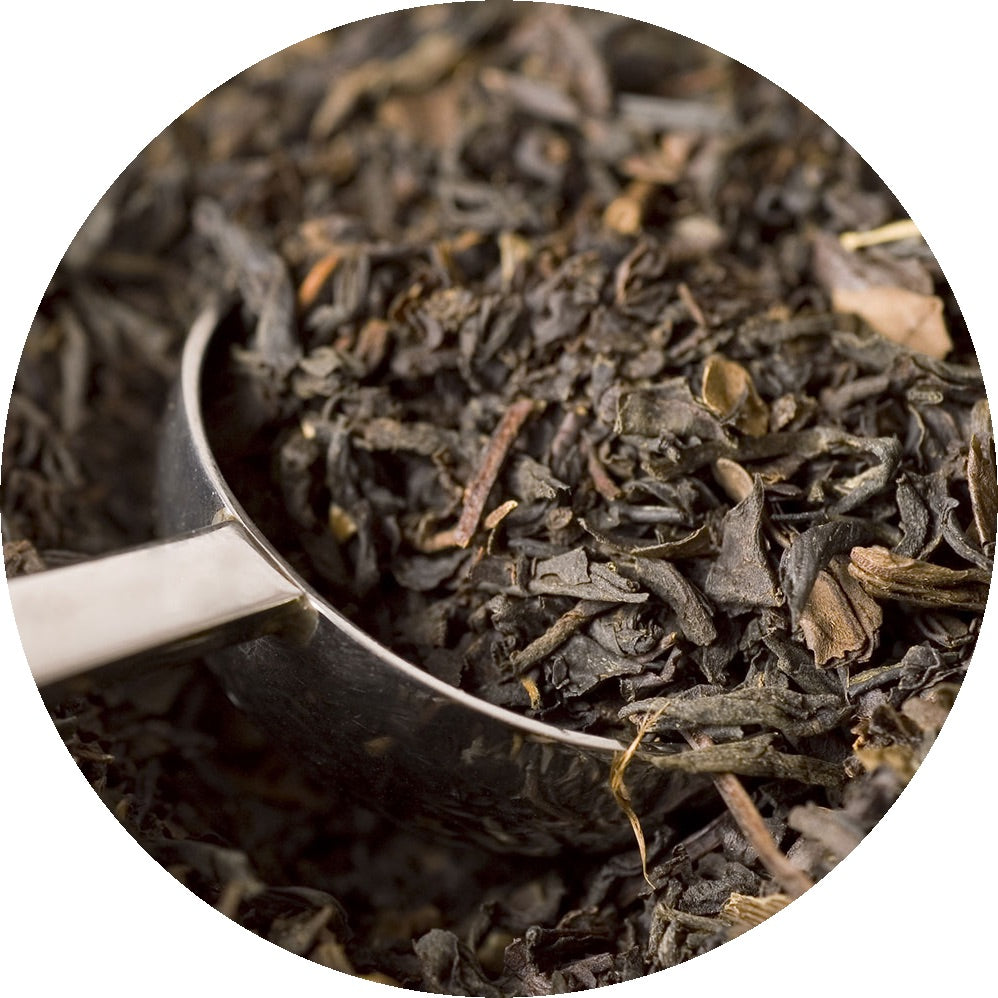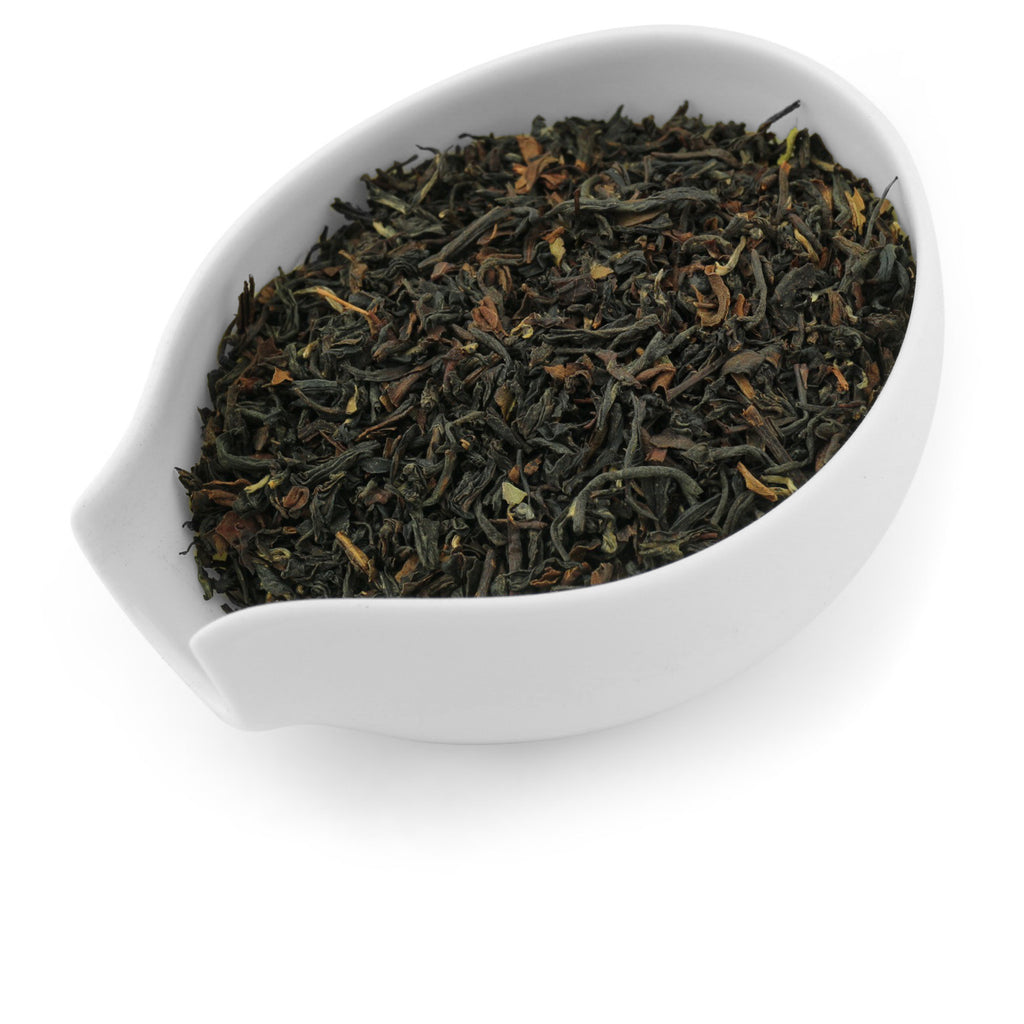Darjeeling Second Flush
From Makaibari, one of the oldest tea estates in Darjeeling, comes this bold second flush black tea. Plucked in the late spring, the second harvest is renowned for its rich, wine-like flavors, often compared to muscat grapes.
Globally recognized for biodynamic farming and commitment to fair trade, Makaibari's teas embody the essence of the land and the ethos of sustainability. The FTGFOP (Fine Tippy Golden Flowery Orange Pekoe) grade denotes the selection of the finest leaves and tips, resulting in a golden-amber infusion with a complex flavor profile. Grown on the slopes of the Himilayas where a cool and misty environment has shaped a naturally-rich profile, free of fertilizers and pesticides.
Each sip of this second flush Darjeeling is a distinctive interplay of vegetal and fruity, enhanced by the celebrated 'muscatel' undertones, making it a suitable choice for various occasions—from a refreshing morning start to a restorative afternoon tea break.


- CHARACTER: Dry and vegetal, muscatel undertone
- ORIGIN: Kurseong, Darjeeling, West Bengal, India
- MEANING: "Second Flush" is the second harvest in late spring
- TEA FARM: Makaibari Estate
- SEASON: Late Spring
- GRADE: FTGFOP (Finest Tippy Golden Flowery Orange Pekoe)
- PROCESSING: Withered, rolled, fully oxidized, dried
- ORGANIC CERTIFICATION: DE-ÖKO-006 (Non-EU Agriculture)
- FLAVOR PROFILE: Vegetal and fruity
- TASTE: Green vegetables, muscatel, dry apricot
-
INTENSITY:
 4
4
- QUANTITY: 6g (3 tsp) / 500ml (17 fl oz)
- WATER TEMPERATURE: 90°C
- FIRST INFUSION: 4.5 min
- SECOND INFUSION: 5 min
- BREWING VESSEL: Porcelain teapot
- STORAGE: Airtight, cool, no sunlight, away from odors
Additional Information

Black tea
The production of black tea involves several distinct phases, each critical to developing the tea's unique flavour, color, and aroma:
- Withering: Freshly picked tea leaves are spread out to wilt and lose moisture, making them pliable.
- Rolling: Withered leaves are rolled mechanically or by hand to break down their cell walls, releasing essential oils and enzymes.
- Oxidation: The rolled leaves are exposed to air, allowing enzymatic oxidation (often referred to as fermentation) to occur. This process develops the tea's color and flavour.
- Drying: To stop oxidation, the leaves are heated through baking or firing, reducing moisture content and fixing the flavour.
- Sorting and Grading: The dried leaves are sorted into grades based on size and quality through sieving, ensuring uniformity in the final product.
Each step is meticulously controlled to achieve the desired quality and characteristics of the finished black tea.
Tea farm
Makaibari Tea Estate is one of the oldest tea gardens in Darjeeling, dating back to 1859. The potential of this tea garden was foreseen by its founders, the famous Banerjee family and was subsequently realized by the present owner, the fourth-generation planter, Mr. Swaraj Kumar Banerjee, also popularly known as Rajah Banerjee. It was under his guidance and pioneering after the year 1970 that Makaibari Tea Estate achieved what other tea gardens haven't throughout the years.


Organic certification and testing
All our teas are organic certified and tested for pesticides, ensuring they meet stringent quality standards. We steadfastly reject the use of artificial flavors and concentrated aromas. Our approach to creating flavored and blended teas is deeply intentional, involving the in-house selection and combination of each ingredient. Our commitment extends to using only organically certified, whole spices, deliberately avoiding grinding them into fine powders. This choice ensures our teas remain pure and clear, as finely ground spices can release excessive power into the brew, compromising its clarity. The essence of our fruit flavors comes from organic essential oils, obtained through cold press technology to preserve the natural qualities without the degradation that can occur with heat. Proudly, every ingredient in Nannuo Pop is organically certified, embodying our unwavering commitment to purity and quality, without exceptions. This commitment to quality and safety reflects our dedication to providing the best possible product to our customers, with a focus on health and environmental sustainability.
Nannuo Pop
Welcome to Nannuo Pop, where our passion for tea transcends the ordinary, delivering an experience that is not only organic but unparalleled in taste and quality. At the heart of Nannuo Pop, our ethos is rooted in a commitment to fully organic products. Every leaf in our collection and each ingredient that graces our blends is organically certified, ensuring that your tea experience is pure, natural, and unadulterated.
Our quest for best in class teas is a journey of meticulous selection, guided by the refined palates of experienced tea tasters. These connoisseurs of taste screen an extensive array of organic teas, conducting blind tastings that disregard price and origin, to focus solely on flavour. A tea earns its place in our collection only if it receives independent approval from at least two of our tasters, guaranteeing a selection that's truly the best. This rigorous selection process extends to our blends, where ingredients are chosen not just on experience but through exhaustive trial sessions, mixing a myriad of teas and spices in various ratios until the perfect balance is achieved.
But our commitment to excellence doesn't stop at quality. At Nannuo Pop, we believe in making exceptional tea accessible to every wallet. By marrying a minimal margin policy with cutting-edge digitalization and automation, we manage to keep our teas affordably priced. This approach ensures that our teas are not just superior in taste but also in value, making luxury accessible to every tea lover.
Join us at Nannuo Pop, and embark on a journey through the world of tea, where every sip is a testament to purity, quality, and the joy of discovery.







